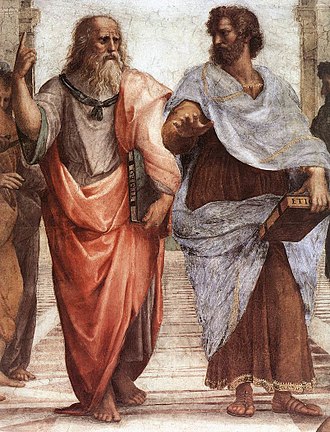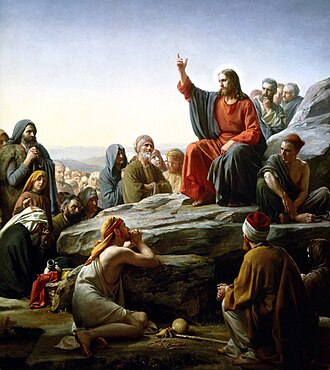Welcome to the Seeds of the Word wiki
Semina Verbi or Seeds of the Word is a cultural project aimed at examining the ways in which the Christian Gospel in particular, and the Word of God in general, have influenced the cultures of mankind, or how the cultural and creative expressions of mankind can have seeds of truth which are related to the Truth of the Word of God.



Origins of the expression
Early Christian apologists
The expression goes back to Justin the Martyr and to Clement of Alexandria.
Saint Justin (100-165 AD) affirms in his Second Apology:
For I myself, when I discovered the wicked disguise which the evil spirits had thrown around the divine doctrines of the Christians, to turn aside others from joining them, laughed both at those who framed these falsehoods, and at the disguise itself and at popular opinion and I confess that I both boast and with all my strength strive to be found a Christian; not because the teachings of Plato are different from those of Christ, but because they are not in all respects similar, as neither are those of the others, Stoics, and poets, and historians. For each man spoke well in proportion to the share he had of the spermatic word, seeing what was related to it. But they who contradict themselves on the more important points appear not to have possessed the heavenly wisdom, and the knowledge which cannot be spoken against. Whatever things were rightly said among all men, are the property of us Christians. For next to God, we worship and love the Word who is from the unbegotten and ineffable God, since also He became man for our sakes, that becoming a partaker of our sufferings, He might also bring us healing. For all the writers were able to see realities darkly through the sowing of the implanted word that was in them...
And Saint Clement of Alexandria (150-215 AD) affirms in his Stromata:
For, like farmers who irrigate the land beforehand, so we also water with the liquid stream of Greek learning what in it is earthy; so that it may receive the spiritual seed cast into it, and may be capable of easily nourishing it. The Stromata will contain the truth mixed up in the dogmas of philosophy, or rather covered over and hidden, as the edible part of the nut in the shell. For, in my opinion, it is fitting that the seeds of truth be kept for the husbandmen of faith, and no others. I am not oblivious of what is babbled by some, who in their ignorance are frightened at every noise, and say that we ought to occupy ourselves with what is most necessary, and which contains the faith; and that we should pass over what is beyond and superfluous, which wears out and detains us to no purpose, in things which conduce nothing to the great end. Others think that philosophy was introduced into life by an evil influence, for the ruin of men, by an evil inventor. But I shall show, throughout the whole of these Stromata, that evil has an evil nature, and can never turn out the producer of anything that is good; indicating that philosophy is in a sense a work of Divine Providence.
While Eusebius of Caesarea (260-339 AD), in his Praeparatio Evangelica, affirms that the Greeks were clearly influenced in their philosophy by the Hebrew Scriptures, thus affirming from another point of view that the best in human culture was influenced by the Word of God:
THE preceding Book, which is the tenth of the Evangelical Preparation, was intended to prove by no statements of my own, but by external testimonies, that as the Greeks had contributed no additional wisdom from their own resources, but only their force and elegance of language, and had borrowed all their philosophy from Barbarians, it was not improbable that they were also not unacquainted with the Hebrew Oracles, but had in part seized upon them also; seeing that they did not keep their hands clean from theft even of the literary efforts of their own countrymen...
Moreover in the same Book we learned by the comparison of dates that they were very young in age as well as in wisdom, and fell very far short of the ancient literature of the Hebrews.
Such were the contents of the preceding Book: but in this present one we hasten on at once to pay as it were a debt, I mean the promise which was given, and to exhibit the agreement of the Greek philosophers with the Hebrew Oracles in some if not in all their doctrinal theories.
The patrologist Berthold Altaner writes in regards to Justin the Martyr and his expression “seeds of the Word”:
Con la sua teoria di λόγος σπερματικός [logos spermatikos] Giustino getta un ponte tra la filosofia antica e il Cristianesimo. In Cristo apparve, in tutta la sua pienezza, il Logos divino, ma ogni uomo possiede nella sua ragione un germe (σπέρμα) del Logos. Questa partecipazione al Logos, e conseguente disposizione a conoscere la Verità, fu in alcuni particolarmente grande; cosí nei Profeti del giudaismo e, fra i greci, in Eraclito e Socrate. Molti elementi della verità sono passati, cosí egli opina, nei poeti e nei filosofi greci dell’antica letteratura giudaica, poiché Mosè era ritenuto lo scrittore assolutamente piú antico. Di conseguenza i filosofi, in quanto vissero e insegnarono conformemente alle regole della ragione, furono dei Cristiani, in un certo senso, prima della venuta di Cristo. Tuttavia solo dopo questa venuta i Cristiani sono entrati in possesso della verità totale e sicura, priva di ogni errore. Il pensiero teologico di San Giustino è fortemente influenzato dalla filosofia stoica e platonica
With his theory of λόγος σπερματικός [logos spermatikos] Justin builds a bridge between ancient philosophy and Christianity. In Christ the divine Logos appeared in all his fullness, but every man possesses in his reason a germ (σπέρμα) of the Logos. This participation in the Logos, and consequent disposition to know the Truth, was particularly great in some; so in the Prophets of Judaism and, among the Greeks, in Heraclitus and Socrates. Many elements of the truth have passed, so he opines, in the Greek poets and philosophers of ancient Jewish literature, since Moses was considered the most ancient writer. Consequently, the philosophers, insofar as they lived and taught according to the rules of reason, were Christians, in a sense, before the coming of Christ. However, only after this coming did Christians come into possession of the total and sure truth, devoid of any error. The theological thought of Saint Justin is strongly influenced by Stoic and Platonic philosophy
— , Patrologia, Marietti, 7ª ed., 1977, pp. 70-71
Roots in the Gospel and the New Testament writings
Jesus of Nazareth compared himself to a sower of seeds when he proclaimed the Parable of the Sower to the crowds of people listening to Him.
The speech of Saint Paul to the Athenians in the Areopagus is emblematic, as he refers to a known greek poet in order to make his point about the Gospel of Jesus, as well as making reference to their religious traditions:
Magisterial Teachings of the Catholic Church
The doctrine of the Seeds of the Word, interpreted as truths of the Gospel being spread throughout human culture, is also present in the teachings of the Second Vatican Council. The Decree on Missionary Activity Ad Gentes affirms:
In order that they may be able to bear more fruitful witness to Christ, let [Christians] ... acknowledge themselves to be members of the group of men among whom they live; let them share in cultural and social life by the various undertakings and enterprises of human living; let them be familiar with their national and religious traditions; let them gladly and reverently lay bare the seeds of the Word which lie hidden among their fellows.
Similarly the Dogmatic Constitution on the Church Lumen Gentium states:
Whatever good or truth is found amongst [those men who have not yet arrived at an explicit knowledge of God] is looked upon by the Church as a preparation for the Gospel.
The Declaration on non Christian religions Nostra Aetate uses the simile of a ray of light to express the same concept:
From ancient times down to the present, there is found among various peoples a certain perception of that hidden power which hovers over the course of things and over the events of human history; at times some indeed have come to the recognition of a Supreme Being, or even of a Father. This perception and recognition penetrates their lives with a profound religious sense. ... The Catholic Church rejects nothing that is true and holy in these religions. She regards with sincere reverence those ways of conduct and of life, those precepts and teachings which, though differing in many aspects from the ones she holds and sets forth, nonetheless often reflect a ray of that Truth which enlightens all men.
In the years following the Second Vatican Council, the metaphor Seeds of the Word and the theme Praeparatio evangelica were also used by the Popes.
Pope Paul VI, in the Apostolic Exhortation on evangelization, states:
[Non-christian religions] are all impregnated with innumerable "seeds of the Word" and can constitute a true "preparation for the Gospel", to quote a felicitous term used by the Second Vatican Council and borrowed from Eusebius of Caesarea.
— , Evangelii nuntiandi, n. 53
Pope John Paul II, in his first encyclical Redemptor Hominis, writes:
The Fathers of the Church rightly saw in the various religions as it were so many reflections of the one truth, "seeds of the Word", attesting that, though the routes taken may be different, there is but a single goal to which is directed the deepest aspiration of the human spirit as expressed in its quest for God and also in its quest, through its tending towards God, for the full dimension of its humanity, or in other words for the full meaning of human life.
— , Redemptor Hominis, n. 11
And the Catechism of the Catholic Church, quoting from Lumen Gentium, states:
The Catholic Church recognizes in other religions that search, among shadows and images, for the God who is unknown yet near since he gives life and breath and all things and wants all men to be saved. Thus, the Church considers all goodness and truth found in these religions as "a preparation for the Gospel and given by him who enlightens all men that they may at length have life."
—
Overview of the areas touched on
The articles of this encyclopedia are organized into the following general categories: